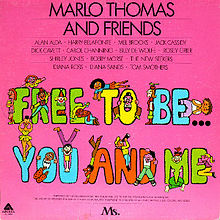Last month I mailed a copy of the CD version of Free to Be You and Me, the 1974 musical collection developed by Marlo Thomas to my feminist friend who is having her first baby. Thomas got her “famous” friends together (Alan Alda, Rosey Grier, Tom Smothers, Diana Ross, Mel Brooks, Billy de Wolfe, Carol Channing, Dick Cavett, and Shirley Jones) to make this album of songs and stories as an antidote to the lack of gender free toys and books on the shelves as she searched for a birthday gift for her niece. (Imagine getting this present from your Aunt Marlo?).
I don’t know how old I was when my parents gave me this album, but it came with a songbook of the words and I learned every one of them. As I entered adulthood, I made copies for baby shower favors for my brother and for my best friend. And while a 40 year old songbook seems dated, it is still very relevant.
Christina Hoff Sommers provides a trenchant tribute in her March 11th Time Magazine article “‘Free to Be’ Boys and Girls: 40 Years After the Failed Gender Revolution.” She negatively summarizes some of the songs and stories, stating “the songs drive home the idea that we are all androgynous beings unfairly constrained by social stereotypes.” Then she goes on to use the example of the American Girl Doll franchise to demonstrate how boys do not go for dolls; and that is another failure of the women’s movement for gender equality. WHAT?
Ms Hoff Sommers, you are clearly missing the point. The point is not that boys want dolls. The point is that men want to be active engaged daddies and that mommies want help. And yes, Ms Hoff Sommers, there has been a shift in 40 years toward this endeavor I call equality. I know many of you would cite examples like this, but my little brother and his wife are true equal parents to their little boy. They take turns doing all the parenting pieces required to raise a child in today’s world.
But then Ms Hoff Sommers begins her descent down the slippery slope of stereotyping.
But, after 40 years of gender activism, boys and girls show few signs of liking to do the same things. From the earliest age, boys show a distinct preference for active outdoor play, with a strong predilection for games with body contact, conflict, and clearly defined winners and losers. Girls, too, enjoy raucous outdoor play, but they engage in it less. Girls, as a rule, are more drawn to imaginative theatrical games — playing house, playing school — as well as exchanging confidences with a best friend. Boys playing kickball together in the schoolyard are not only having a great deal of fun, they are forging friendships with other males in ways that are critical to their healthy socialization. Similarly, little girls who spend hours in deep conversation with other girls or playing theatrical games are happily and actively honing their social skills.
To suggest that the ways in which boys and girls like to play, as socialized by their parents and our culture, is a prediction for whether they will parent in sex stereotyped roles is a reach. Free to Be You and Me was about looking ahead to the future where limits wouldn’t be placed on what girls and boys wanted to do with their lives. (This was really happening in 1974. Remember “Help Wanted” ads for men only or girls only?) Free to Be You and Me was not, and is not, what Hoff Sommers calls “a cautionary example of how an idealistic social fantasy can turn into a blueprint for repression.” Sex stereotyping and limiting women’s and men’s ability to develop their own free expression is repression. Patriarchy, which still exists, Ms Hoff Sommers, is the blueprint for repression and continues its architecture in many places across the globe.
Marlo Thomas and her friends planted within me, from this album, a passion for equality, justice, freedom, and theatrical expression. And forty years later, I am thankful to her for that.
